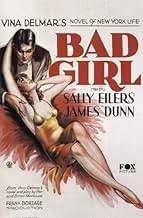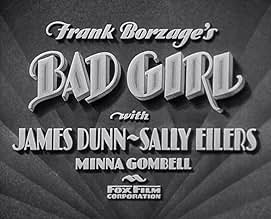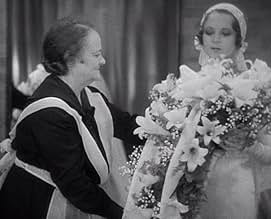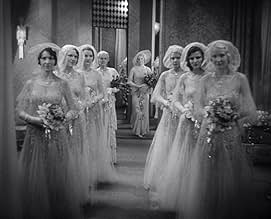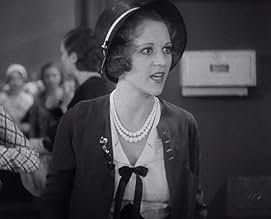IMDb RATING
6.4/10
1.8K
YOUR RATING
Two adolescents fall in love and are wed, but misunderstandings born from a lack of trust and communication haunt their marriage.Two adolescents fall in love and are wed, but misunderstandings born from a lack of trust and communication haunt their marriage.Two adolescents fall in love and are wed, but misunderstandings born from a lack of trust and communication haunt their marriage.
- Won 2 Oscars
- 6 wins & 1 nomination total
Frank Austin
- Upstairs Tenement Neighbor
- (uncredited)
Irving Bacon
- Expectant Father
- (uncredited)
William Bailey
- Expectant Father of Twins
- (uncredited)
Sue Borzage
- Unknown
- (uncredited)
Jesse De Vorska
- Expectant Father
- (uncredited)
Bud Eilers
- Man Outside Candy Shop
- (uncredited)
Edward Hearn
- Male Nurse
- (uncredited)
Aggie Herring
- Seamstress
- (uncredited)
Claude King
- Dr. Burgess
- (uncredited)
Louis Natheaux
- Mr. Thompson
- (uncredited)
Sarah Padden
- Mrs. Gardner
- (uncredited)
Lorin Raker
- Male Nurse
- (uncredited)
Featured reviews
A man and woman get married, she gets pregnant, and then the two of them spend the rest of the movie wondering if the other really wants to have a baby. They could just talk to each other about it I suppose, but then there wouldn't be a reason for this film's existence.
"Bad Girl" is a bit of a curio in that it won Oscars for Best Director (Frank Borzage) and Best Writing (Adaptation) at the 1931-32 Academy Awards, but who's even heard of this movie now? It's not very memorable, and it's a testament to the power of the Academy Awards, whether or not you personally give them any credence, that films like this are kept afloat in front of modern-day audiences based on the fact that they won some Oscars back in the day. That's certainly the motive for my seeking it out, whereas any number of other early talkies that are no better or worse than this one fade into obscurity.
James Dunn and Sally Eilers are pretty good, and talkies were still new enough that it's refreshing to find actors who knew how to act with sound as their medium. It's also fun to see movies from this time period because they give us a glimpse into what life was like during the Great Depression.
Many comments have said that the title is completely irrelevant to anything that happens in the movie. That's not entirely true. When Dunn first meets Eilers at Coney Island, they have a conversation where he mentions something about how everyone has both bad and good in them, and the idea that both husband and wife suspect the "bad" in each other drives much of their behavior throughout the rest of the film. But I do agree that the theme isn't explored very fully, and it is a misleading title.
In addition to the two Oscars it won, "Bad Girl" was nominated for Best Picture.
Grade: B
"Bad Girl" is a bit of a curio in that it won Oscars for Best Director (Frank Borzage) and Best Writing (Adaptation) at the 1931-32 Academy Awards, but who's even heard of this movie now? It's not very memorable, and it's a testament to the power of the Academy Awards, whether or not you personally give them any credence, that films like this are kept afloat in front of modern-day audiences based on the fact that they won some Oscars back in the day. That's certainly the motive for my seeking it out, whereas any number of other early talkies that are no better or worse than this one fade into obscurity.
James Dunn and Sally Eilers are pretty good, and talkies were still new enough that it's refreshing to find actors who knew how to act with sound as their medium. It's also fun to see movies from this time period because they give us a glimpse into what life was like during the Great Depression.
Many comments have said that the title is completely irrelevant to anything that happens in the movie. That's not entirely true. When Dunn first meets Eilers at Coney Island, they have a conversation where he mentions something about how everyone has both bad and good in them, and the idea that both husband and wife suspect the "bad" in each other drives much of their behavior throughout the rest of the film. But I do agree that the theme isn't explored very fully, and it is a misleading title.
In addition to the two Oscars it won, "Bad Girl" was nominated for Best Picture.
Grade: B
A wildly uneven film that seems as confused as its marketing. The pre-Code era was known for salacious titles and advertisement, but I don't think I've ever seen a film more at odds with its poster. I'm not kidding, these are the words underneath the poster of the main character (Sally Eilers) leaning back with her ukulele:
EVERYBODY KNOWS THIS GIRL There's one in every town Tumult in her heart. She wanted things. Clothes. Boy friends. Fun. Gayety. Kisses. * Red-lipped shop girl in sleazy dress, Aching with suppressed emotions ... dance halls ... excursion steamers ... chop suey palaces ... Coney Island ... clinging farewells ... then back to the hall bedroom. * Drama of girls ... who love to live. Laughter of girls ... who live to love. * It's romance of the working girl ... today ... your most dependable patron.
In the actual film, nothing could be further from the truth. Eilers' character is not loose, flirtatious, or even pushing on the boundaries of the role women were assigned to. We see a lot of bad male behavior though, e.g. men coming on to her (leading her to remark to her friends that all of them have just one thing on their minds), a controlling brother who hits her for coming home late (alluded to, not shown), and even the guy she's attracted to (James Dunn) doling out insults and mansplaining things. When the two marry on a whim because she fears facing her brother after coming home at 4 am (though not having had sex), he also tells her that no wife of his will be getting a job.
The best part of the film is the support she gets from her friend (Minna Gombell), a tough talking woman who stands up for her. She literally flicks her husband's chin upwards while fixing his tie, and the two part with this exchange: "Bye, Grouch" / "So long, Dizzy."
The film providing a window into the conditions women faced and the bond between friends is when it's at its best, but it's less successful afterwards. At its center this is a relationship picture, with the married couple dealing with tight finances, and miscommunicating when she gets pregnant (they both think the other doesn't want a baby). It got quite tiresome over the last half hour for me. Dunn has a weepy scene where his acting leaves a lot to be desired, then improbably offers himself up in a boxing match for money. The nurse at the hospital oddly teases Eilers' character by bringing out several different babies before giving her hers, and all of these scenes seem like filler for a film that lost its way.
As for the Oscar that director Frank Borzage won for this film, it's frankly hard to understand. It's an average film for the period, with nothing that stood out. The images of light and shadow that Josef von Sternberg captured with Marlene Dietrich in 'Shanghai Express,' on the other hand, are immortal. That year also saw so many other great efforts, e.g. Ernst Lubitsch (The Smiling Lieutenant), Rouben Mamoulian (Dr. Jekyll and Mr. Hyde), Clarence Brown (A Free Soul), Fritz Lang (M), William A. Wellman (The Public Enemy), F.W. Murnau (Tabu), King Vidor (Street Scene), Frank Capra (The Miracle Woman), and Roy del Ruth (Blonde Crazy). I usually don't like to fixate on awards and apologize for this long and pedantic laundry list, but my point is that if you're looking for a stellar film from 1931, you can do so much better than this one.
EVERYBODY KNOWS THIS GIRL There's one in every town Tumult in her heart. She wanted things. Clothes. Boy friends. Fun. Gayety. Kisses. * Red-lipped shop girl in sleazy dress, Aching with suppressed emotions ... dance halls ... excursion steamers ... chop suey palaces ... Coney Island ... clinging farewells ... then back to the hall bedroom. * Drama of girls ... who love to live. Laughter of girls ... who live to love. * It's romance of the working girl ... today ... your most dependable patron.
In the actual film, nothing could be further from the truth. Eilers' character is not loose, flirtatious, or even pushing on the boundaries of the role women were assigned to. We see a lot of bad male behavior though, e.g. men coming on to her (leading her to remark to her friends that all of them have just one thing on their minds), a controlling brother who hits her for coming home late (alluded to, not shown), and even the guy she's attracted to (James Dunn) doling out insults and mansplaining things. When the two marry on a whim because she fears facing her brother after coming home at 4 am (though not having had sex), he also tells her that no wife of his will be getting a job.
The best part of the film is the support she gets from her friend (Minna Gombell), a tough talking woman who stands up for her. She literally flicks her husband's chin upwards while fixing his tie, and the two part with this exchange: "Bye, Grouch" / "So long, Dizzy."
The film providing a window into the conditions women faced and the bond between friends is when it's at its best, but it's less successful afterwards. At its center this is a relationship picture, with the married couple dealing with tight finances, and miscommunicating when she gets pregnant (they both think the other doesn't want a baby). It got quite tiresome over the last half hour for me. Dunn has a weepy scene where his acting leaves a lot to be desired, then improbably offers himself up in a boxing match for money. The nurse at the hospital oddly teases Eilers' character by bringing out several different babies before giving her hers, and all of these scenes seem like filler for a film that lost its way.
As for the Oscar that director Frank Borzage won for this film, it's frankly hard to understand. It's an average film for the period, with nothing that stood out. The images of light and shadow that Josef von Sternberg captured with Marlene Dietrich in 'Shanghai Express,' on the other hand, are immortal. That year also saw so many other great efforts, e.g. Ernst Lubitsch (The Smiling Lieutenant), Rouben Mamoulian (Dr. Jekyll and Mr. Hyde), Clarence Brown (A Free Soul), Fritz Lang (M), William A. Wellman (The Public Enemy), F.W. Murnau (Tabu), King Vidor (Street Scene), Frank Capra (The Miracle Woman), and Roy del Ruth (Blonde Crazy). I usually don't like to fixate on awards and apologize for this long and pedantic laundry list, but my point is that if you're looking for a stellar film from 1931, you can do so much better than this one.
Bad Girl is included in the new Murnau/Borzage and Fox collection,and kudos to them for making it available! Though an excellent little slice of life film from the Depression Era, I definitely wouldn't say that it compares with Borzage's timeless silent romances, though Borzage's recurrent theme of love conquering all is here to.The lead actors,Sally Eilers, and James Dunn, both do fine jobs, especially Dunn, who paints a very realistic portrait of a "regular Joe", decent kind of a guy. His performance rings true, and he later made a comeback, winning the Oscar for Best Supporting Actor in A Tree Grows in Brooklyn.(1945) This is the story of a young couple's struggle to make it through marriage, finances, and becoming parents. The background story of what was considered "making it" in a poor economy is especially pertinent today. Dunn's character, Eddie Collins, thought it was opening his own radio shop, providing his wife with an elaborately furnished apartment, and getting her the best doctor for her delivery. Not so different from what young couples are facing today! The film is sometimes a bit too wordy, but the slang of the time is a hoot! As one of Borzage's smaller films, it's worth a watch.
An interesting little Borzage love story set during the Depression, detailing the struggles of young couple (Sally Eilers & James Dunn) with their hopes and dreams. Curiously Borzage won his second Oscar as Best Director for this oddly heady little movie and that's perhaps the only reason to watch it. It works as a timepiece of its era. But I definitely wouldn't call "Bad Girl" one of Borzage's best romances (in many ways it strikes me as turgid and unaffecting in several moments, and I didn't like the ending), but it is definitely worth catching if you are fan or a student of the director's sublime and unheralded oeuvre.
I finally tracked down Bad Girl. It had been on my list of wanna sees for years as it had won a major Oscar for Best Director- Frank Borzage.It was one of those tantalizing early talkies that had not actually been lost it had merely fell from sight. When I finally saw it last year at a Borzage revival, the film was a revelation.It was a pre-code delight about an ordinary couple, falling in love, struggling financially and having a baby etc.It most reminded me of the great silent film-The Crowd, which dealt with similar matters. What was especially fascinating to me was its depiction of "average" lower middle class types and how they lived and spoke in Depression America. The apartments... the slang, all of it, seemed real. It wouldn't be until the 50's neo realism hit American movies that we would see ordinary people depicted on the screen again, without condescension The movie has all the Borzage trademarks- love surviving against all odds, even an exciting if a little hokey climax.Unfortunately, the film has been slighted often in movie books,most likely, because the authors have never actually seen it. If it is ever shown again, try to see it. It's a wonderful peek at average city folks in Depression America.
Did you know
- TriviaWilliam Pawley played the role of Dorothy's brother in the stage version, and reprises his role here in the film.
- GoofsAt 2:54, shadow of boom mic is visible across Dot's face.
- Quotes
Dorothy Haley: I gotta go upstairs now. You see, my mother's dead, and my brother's boss of the house. He gets sore when I stay out late. You know, he's careful for me. But as Edna says, you can't watch a girl hard enough to keep her good if she don't want to be.
- ConnectionsAlternate-language version of Marido y mujer (1932)
- How long is Bad Girl?Powered by Alexa
Details
- Release date
- Country of origin
- Language
- Also known as
- En dålig flicka?
- Production company
- See more company credits at IMDbPro
- Runtime
- 1h 30m(90 min)
- Color
Contribute to this page
Suggest an edit or add missing content

